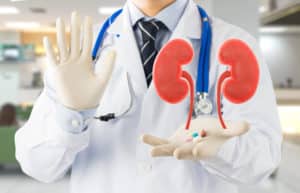Urologic Health is a Priority

Protecting Your Urologic Health
Urologic health is taking care of the urinary tract. This internal part of the body doesn’t receive the same type of care as other areas like the skin and the teeth. Because the urinary tract is all internal, we often don’t consider how what we do and don’t do could affect it. Some of the ways to be mindful of prioritizing urologic health include:
- Drinking plenty of water
- Eating a balanced diet
- Maintaining a healthy weight
- Getting regular exercise
- Refraining from smoking (It is a contributing factor for bladder cancer)
In addition to following these general rules for health and wellness, it is possible to prioritize urologic health by limiting sodium intake. Salt and sodium are factors in fluid retention. When the body retains water, the mineral/water balance in the kidneys may be disrupted. Caffeine, as well, may affect the urinary tract. In this instance, it is because caffeine is a diuretic and can lead to bladder irritation.
According to the Urology Care Foundation, urologic health is also promoted by using good bathroom habits. The foundation advises people to take their time when using the bathroom, allowing their bladder to empty fully so as to decrease the risk of infection. Finally, we should not shy away from talking about our urologic health. If symptoms occur that are out of the ordinary, they should not be ignored. A urologist can provide care that reduces or eliminates symptoms altogether.
Signs That You Should Visit Your Urologist
Telltale signs that you should see a urologist include:
- Pain when urinating
- Blood in the urine
- Inability to urinate
- Significant changes in urinary patterns
- Incontinence
- Frequent urinary tract infections
- Lower abdominal pain
- Erectile dysfunction
- Male impotence
- Male infertility
- Testicular pain
The team at UT Urology specializes in the diagnosis and treatment of a wide variety of pediatric and adult urologic conditions. Contact us today to schedule your consultation.

 To maintain our health and vitality, most of us regularly see our primary care doctor, our dentist, and our eye doctor. Because we’ve been taught to follow this general model of healthcare, confusion may arise should unusual symptoms occur. If symptoms are sexual or urinary in nature, they require the care of a urologist. Most men never think to see a urologist until it is recommended by their primary health physician. This doesn’t usually happen until sometime after age 50. However, there may be a need for
To maintain our health and vitality, most of us regularly see our primary care doctor, our dentist, and our eye doctor. Because we’ve been taught to follow this general model of healthcare, confusion may arise should unusual symptoms occur. If symptoms are sexual or urinary in nature, they require the care of a urologist. Most men never think to see a urologist until it is recommended by their primary health physician. This doesn’t usually happen until sometime after age 50. However, there may be a need for  We expect our various organs to perform well from day to day. For the most part, they do, though they may surprise us from time to time with unexplained symptoms. With age, many men come to realize that they may live with occasional difficulty
We expect our various organs to perform well from day to day. For the most part, they do, though they may surprise us from time to time with unexplained symptoms. With age, many men come to realize that they may live with occasional difficulty  It is no secret that men are notorious for avoiding the doctor until they absolutely must receive
It is no secret that men are notorious for avoiding the doctor until they absolutely must receive  When choosing a healthcare provider, there are certain qualifications one looks for. In the general setting in which a doctor will be chosen to perform
When choosing a healthcare provider, there are certain qualifications one looks for. In the general setting in which a doctor will be chosen to perform  Urologic conditions such as erectile dysfunction, infertility, and overactive bladder may develop as a result of a number of different factors. Some of the factors related to conditions like these relate to how a person lives from day to day. This is good news, because it affords us the opportunity to reduce the risk of urologic problems by looking at lifestyle modifications. One lifestyle change that is recommended often is that smoking comes to an end.
Urologic conditions such as erectile dysfunction, infertility, and overactive bladder may develop as a result of a number of different factors. Some of the factors related to conditions like these relate to how a person lives from day to day. This is good news, because it affords us the opportunity to reduce the risk of urologic problems by looking at lifestyle modifications. One lifestyle change that is recommended often is that smoking comes to an end. The discussion regarding the dangers of smoking has gone on for many years now. However, the prevalence of this common addiction remains high. There is no question that the chemicals in cigarettes and other tobacco products are addictive. There is also no question that they can harm the body in more ways than one. As we discover the reach of these toxic chemicals, the sense of urgency in helping smokers overcome their habit increases.
The discussion regarding the dangers of smoking has gone on for many years now. However, the prevalence of this common addiction remains high. There is no question that the chemicals in cigarettes and other tobacco products are addictive. There is also no question that they can harm the body in more ways than one. As we discover the reach of these toxic chemicals, the sense of urgency in helping smokers overcome their habit increases.